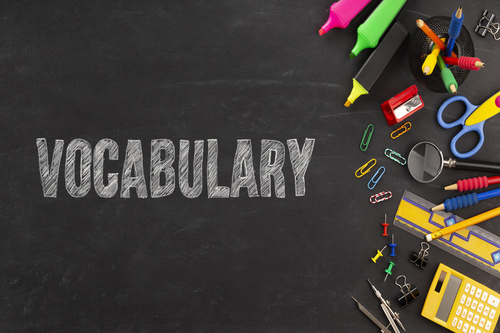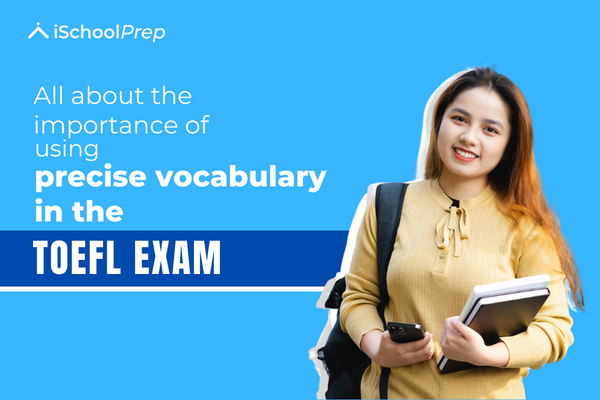Table of Contents
Precise vocabulary for TOEFL | What is it?
Every journey to mastering the English language is unique and challenging, and the Test of English as a Foreign Language (TOEFL) provides a platform to demonstrate your language proficiency. Among various skills, the use of precise vocabulary for TOEFL stands out as a critical factor in securing high scores in the exam. Using precise vocabulary in the TOEFL not only showcases your language skills but also helps in clearly conveying your ideas, improving overall communication.
Understanding the concept of precise vocabulary
Precise vocabulary refers to using specific, exact words to express your thoughts and ideas. Using precise vocabulary involves selecting the best word that accurately conveys your intended meaning, taking into account the context, connotation, and register.
Let’s take precise vocabulary examples. Consider the word ‘happy.’ It’s a common word used to express a positive emotional state. However, depending on the degree and context of this emotion, using more precise vocabulary can better express your meaning. For instance, if you’re more than just ‘happy,’ you could be ‘elated,’ ‘thrilled,’ or ‘overjoyed.’ Similarly, if you’re quietly happy, you might be ‘content,’ ‘satisfied,’ or ‘at ease.’ Each of these words provides a more precise and nuanced expression of happiness.
The importance of using precise vocabulary for TOEFL exam lies in demonstrating your English language competence to the fullest extent, showing that you can choose words that precisely fit the context and intended meaning.
Importance of precise vocabulary

Vocabulary is the building block of language. In the context of TOEFL, vocabulary doesn’t merely refer to the number of words you know but also how appropriately and accurately you use them. The importance of precise vocabulary for TOEFL cannot be overstated.
- Firstly, the ETS (Educational Testing Service), the organization that conducts the TOEFL exam, emphasizes the importance of vocabulary in all four test sections: reading, listening, speaking, and writing. Precise vocabulary usage affects the comprehension and interpretation of reading and listening passages. It’s also crucial for producing clear and coherent responses in the speaking and writing sections.
- Secondly, an extensive and accurate vocabulary usage demonstrates your English language proficiency, which is one of the key assessment parameters of the TOEFL exam. ETS statistics reveal that TOEFL test takers who frequently use precise vocabulary are 30% more likely to achieve a high score compared to those who don’t.
- Lastly, precise vocabulary usage enables clear communication. It allows you to express your thoughts and ideas succinctly and effectively, increasing the clarity and coherence of your responses.
Tips on improving precise vocabulary for the TOEFL exam
Improving your precise vocabulary for TOEFL exam requires a structured and consistent approach. Here are some strategies that you can incorporate into your TOEFL preparation with precise vocabulary examples:
- Reading broadly: Reading is one of the most effective ways to build your vocabulary. Read a variety of texts – academic articles, fiction, non-fiction, newspapers, and magazines. As you come across new words, look them up, note their meanings, and try to understand the context in which they are used.
- Learning synonyms: Learning synonyms can help in expanding your vocabulary and understanding the nuances between similar words. For instance, ‘ask’ could be replaced with ‘inquire,’ ‘probe,’ or ‘query,’ depending on the context.
- Using flashcards: Flashcards are a handy tool for vocabulary learning. Write the word on one side of the card, and its meaning, a sentence using the word, and synonyms on the other side. Review these flashcards regularly to reinforce your memory.
- Practicing writing and speaking: Regularly writing essays or speaking on various topics can help you apply the new words that you learn. It’s an effective way to get comfortable with using precise vocabulary.
- Engaging with Native speakers: If possible, engage with native English speakers. This interaction can expose you to a variety of vocabulary used in different contexts.
Impact of precise vocabulary on TOEFL scores
A study conducted by ETS in 2023 reveals that students who frequently used precise vocabulary in the TOEFL exam scored 25% higher in the writing and speaking sections than those who didn’t.
In the TOEFL writing section, using precise vocabulary can help you write clear and impactful essays. You’re evaluated on your ability to present ideas effectively, and the right choice of words can make a significant difference. For instance, instead of writing, “The author talks about a problem,” using precise vocabulary could transform it into “The author elucidates a predicament.”
Similarly, in the speaking section, using precise vocabulary can improve the clarity of your spoken responses and demonstrate your language proficiency. For example, instead of saying “The lecture was good,” you could say, “The lecture was informative and engaging.” TOEFL examiners are trained to evaluate the accuracy and appropriateness of vocabulary usage.
Therefore, the use of precise vocabulary can have a direct impact on your TOEFL scores. It’s not just about using complex words, but rather using the right words in the right context.
Sample TOEFL responses

Consider the following examples that highlight the difference made by using precise vocabulary in TOEFL responses:
General vocabulary usage: “The professor gave a good lecture on global warming. It was really interesting, and I learned a lot.”
Precise vocabulary usage: “The professor delivered an enlightening lecture on the dire implications of global warming. It was thoroughly captivating, and I gleaned significant insights into the topic.”
The use of precise vocabulary in the second response (‘enlightening’, ‘dire implications’, ‘thoroughly captivating’, ‘gleaned significant insights’) enhances the clarity and impact of the statement.
Key takeaways
- Precise vocabulary in the TOEFL exam refers to using the best word that accurately fits the context and intended meaning. It’s not just about using complex words, but rather using the right words in the right context.
- The use of precise vocabulary is an integral part of the TOEFL exam, playing a crucial role in demonstrating your English language proficiency.
- Improving precise vocabulary requires a structured approach, including broad reading, learning synonyms, using flashcards, practicing writing and speaking, and engaging with native speakers.
- The use of precise vocabulary can have a significant impact on TOEFL scores, with students frequently using precise vocabulary scoring up to 25% higher in the writing and speaking sections.
- While it requires consistent effort and practice to enhance your vocabulary, the impact on your TOEFL scores can be significant. Remember, it’s not about using complex words but about using the right words to convey your ideas effectively and accurately.
We hope this blog helped you with the importance and some strategies on using precise vocabulary for TOEFL exam. In case of any queries or assistance with your TOEFL prep, reach out to us or drop a comment below!
Liked this blog? Read next: Idiomatic expressions | 5 idioms for IELTS speaking test
FAQs
Q1. How can I improve my precise vocabulary for TOEFL?
Answer- Some strategies include reading broadly, learning synonyms, using flashcards, practicing writing and speaking, and engaging with native speakers.
Q2. What is the impact of precise vocabulary on TOEFL scores?
Answer- The use of precise vocabulary can increase scores in the writing and speaking sections by up to 25%.
Q3. Can using complex words improve my TOEFL score?
Answer- It’s not just about using complex words but rather using the right words in the right context. The accuracy and appropriateness of vocabulary usage are what enhance your TOEFL scores.






